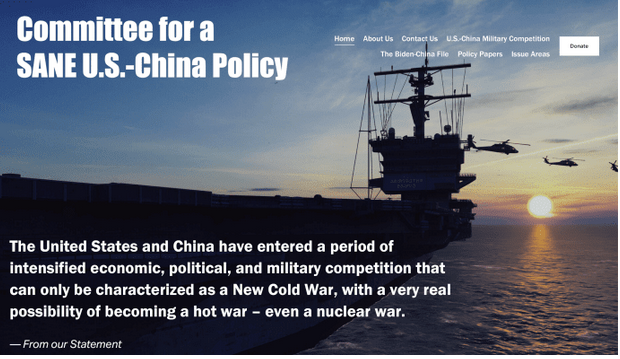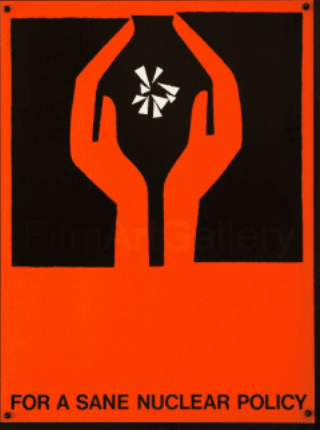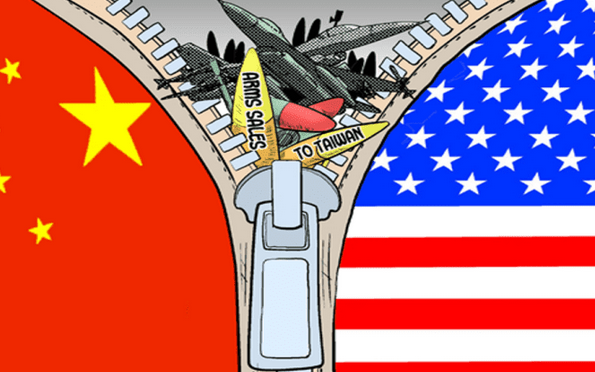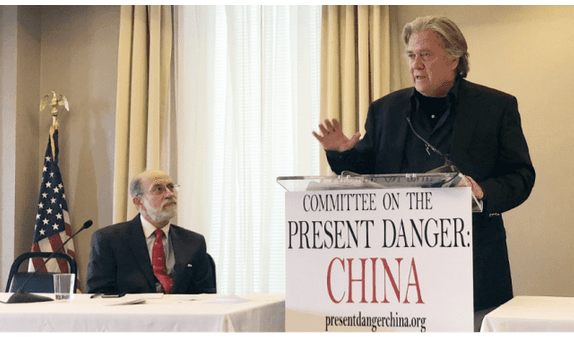Michael T. Klare, professor emeritus of peace and world security studies at Hampshire College, and Joseph Gerson, president of the Campaign for Peace, Disarmament and Common Security, have announced the launch of a new organization, the Committee for a SANE U.S.-China policy, that seeks to counter the U.S. drive to war with China that went into high gear with the Trump administration and threatens to continue under the Biden administration.

An image from the homepage of The Committee for a SANE U.S.-China Policy
At the launching webinar on Wednesday January 27th, Gerson stated that the goal of the Committee for a SANE U.S.-China Policy was to educate the public about China and U.S.-China relations, and to build a base of advocates and activists who could work to deescalate tensions between the two countries.
 |
 |
| Joseph Gerson | Michael T. Klare |
The new committee derives its name from the now-defunct National Committee for a SANE nuclear policy, an organization advocating for nuclear disarmament that was co-founded in 1957 by Norman Cousins, the editor of The Saturday Review who brought survivors of the atomic attacks on Hiroshima and Nagasaki to the U.S. for medical treatment.

Handbill for original SANE group.
Gerson noted that “President Biden has said that he was going to be more aggressive towards China, but we urgently need to dial back confrontation and to pursue common security and diplomacy. Chinese Premier Xi Jinping has called for the avoidance of a new Cold War, which is what we seek.”
Michael Klare in his talk emphasized that China was the most important foreign policy challenge facing the new Biden administration.
The U.S., he noted, has a choice to either extend Donald Trump’s provocations—such as sending B-52 bombers to the edge of Chinese airspace and meeting with Taiwanese leaders in violation of long-standing diplomatic protocols—or to try to recalibrate U.S.-Chinese relations on a positive footing.
By every indication, Biden seems intent on the former, as is evident by his appointment of China hawks like Kurt Campbell, an architect of the Obama administration’s Asia Pivot policy or military buildup in Asia, as the new “Asia Czar” (the senior official for Asia policy).
Secretary of State Tony Blinken tellingly asserted in his Senate confirmation hearing that “Trump was right in taking a tougher approach to China.”
Klare explored possibilities to turn present hostile policies into areas of cooperation in the volatile South China Sea. He asked the audience to imagine how U.S. citizens would react if China moved its jet bombers into the Atlantic Ocean off our shores—the equivalent of what the Trump administration had done by placing American B-52 bombers in the South China Sea; or if China tried to ruin the U.S. economy as Trump did through his trade wars and by trying to bar U.S. companies from doing business with major Chinese companies like the telecommunications giant Huawei.
U.S. B-52 bombers over the South China Sea.
Rachel Esplin Odell, an Asia security expert at the Quincey Institute for Responsible Statecraft, followed Klare by warning that a military crisis could arise in the waters off the South China Sea if the U.S. continued to provoke China there.
Rachel Esplin Odell, Asia expert at the Quincey Institute for Responsible Statecraft.
Odell pointed out that the U.S. military escalation was based on the exaggerated belief that China was a threat to open navigation on the seas, when, in fact, China needs freedom of navigation to secure its Middle East Oil and assure the safety of its massive trade throughout the region.
Odell emphasized that U.S. interventionist policies were provoking anxieties in China causing it to pursue more aggressive land claims in disputed islands in the South China Sea. She called instead for an inclusive strategy to reduce tensions in the Western Pacific. Both Klare and Odell urged support for the adoption of an ASEAN Code of Conduct for the South China Seas as a basis for building cooperation on such volatile issues as conflicting claims to extract sea resources.
The final speaker, Zhiqun Zhu, the chairman of the international relations department at Bucknell University, lamented the fact that China had become a “punching bag” in Washington and asked whether the China hawks actually cared about human rights in China or were using China’s human rights abuses to promote their own agenda. Instead, he proposed a series of proactive measures based on shared U.S.-China interests. These included U.S. restoration of its Fulbright and Peace Corps programs in China, cooperation between the two nations on Covid-19 and on climate change. He also urged negotiation of a free trade agreement and a bilateral investment treaty among the two nations as a means to overcome the poisonous atmosphere.
Zhiqun Zhu, Chairman of the department of International Relations at Bucknell University in Lewisburg, Pennsylvania.
While offering valuable critical analysis of U.S.-China relations, the webinar left out a number of sensitive topics that will have to be addressed in future. These (1) the role of the U.S. in stirring the protests in Hong Kong, (2) China’s conflict with the Uighurs, Tibetans, and Mongols, and (3) The U.S. request for the extradition from Canada of Huawei executive Meng Wangzhou to stand trial in the U.S. These are among the issues which will need to be explored in future events and position papers at the SANE website in the interest of easing U.S.-China tensions and bringing peace to the South China Sea.
The Committee for a SANE U.S.-China Policy’s website promotes the group’s mission statement and provides a timeline of provocative military actions taken by the U.S. in recent months as well as papers and documents on U.S.-China conflicts.
Policy papers advocate measures such as the freezing of arms sales to Taiwan in return for comparable measures on the Chinese side such as a reduction in China’s deployment of ballistic missiles aimed at Taiwan.
This cartoon sheds underlines the fact that large U.S. arms sales to Taiwan impede U.S.-China relations.
Gerson’s essay on the site urges the Biden administration to pursue a reset policy towards China and push for: (1) the restoration of U.S.-Chinese military-to-military consultations, and (2) the renewal of the U.S.-China Strategic and Economic Dialogue suspended by the Trump Administration.
Gerson also advocates (1) reengaging with the Association of South East Asian Nations’ (ASEAN) Regional Forum and supporting establishment of a binding Southeast Asian Code of Conduct regarding military operations in the South China Sea and for pursuing joint development of the sea’s mineral resources by nations with overlapping territorial claims; and (2) pursuing an agreement whereby the United States would permanently cease its freedom of navigation operations in exchange for Chinese demilitarization of its island bases.
Given the current political climate and the Biden appointments, it is unlikely that the latter recommendations will be enacted any time soon—though popular pressure sparked by the Committee for a SANE U.S.-China policy and like-minded groups could produce fresh thinking.
The Committee for a Sane U.S.-China Policy website portal reads: The United States and China have entered a period of intensified economic, political, and military competition that can only be characterized as a New Cold War, with a very real possibility of becoming a hot war—even a nuclear war.
The Committee’s policy recommendations are particularly urgent antidotes to Steve Bannon’s Committee on the Present Danger: China which promotes negative disinformation and hatred against China and advocates for an expansive military buildup in the South China Seas.1
Bannon (right) speaks before the Committee on the Present Danger: China. Frank Gaffney (left) is the president of the Center for Security Policy and vice president of the Committee on the Present Danger: China. [Source: scmp.com]
Headed by a number of ex-military and CIA officers and neoconservatives like Gaffney who promoted the war in Iraq, the Committee on the Present Danger: China is the third iteration modeled after the Cold War organization, the Committee on the Present Danger (CPD).
The original Committee on the Present Danger was founded in the early 1950s by Paul Nitze, the author of the policy planning document NSC-68 that advocated an aggressive rollback strategy directed against the Soviet Union and tried to block arms control treaties and overtures towards détente with Russia.
One of the main challenges to anti-Soviet policies in the early stages of U.S.-Soviet conflict then was offered by SANE, whose reincarnation today offers a renewed vehicle for activists to try to prevent the outbreak of another major war.
Notes
In its mission statement, the Committee on the Present Danger: China asserts that China represents “an existential and ideological threat to the United States and idea of freedom [that] requires a new American consensus regarding the policies and priorities required to defeat this threat.”







